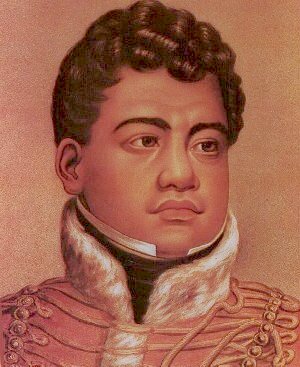Native Hawaiians
Native Hawaiians (Kānaka ʻŌiwi, Kānaka Maoli, and Hawaiʻi Maoli) are the indigenous Polynesian people of the Hawaiian Islands. They are the original inhabitants of the islands and are considered to be part of the broader category of Polynesians, who are spread across the central and southern Pacific Ocean. Native Hawaiians have a rich cultural heritage that predates the arrival of Captain James Cook in 1778, marking the first documented contact between Europeans and the Hawaiian Islands.
History[edit | edit source]
The history of Native Hawaiians is deeply rooted in oral traditions and cultural practices. According to these traditions, Hawaiians originated from Kahiki, a mythical land, often identified with Tahiti. They navigated the ocean using stars, wind, and bird patterns, showcasing advanced skills in wayfinding and Polynesian navigation. The first settlers are believed to have arrived in Hawaii around 300-600 AD, establishing complex societies based on agriculture, fishing, and social hierarchy.
The arrival of Europeans in the 18th century brought significant changes to the Native Hawaiian population and culture. Diseases introduced by foreigners decimated the population, and the social structure began to change under the influence of Western ideologies. The 19th century saw the consolidation of the Hawaiian Islands under a single monarchy, the Kingdom of Hawaii, which was eventually overthrown in 1893 with the support of American and European businessmen. Hawaii was annexed by the United States in 1898.
Culture[edit | edit source]
Native Hawaiian culture is a vibrant part of Hawaii's identity, encompassing music, dance, language, and art. The hula, a traditional dance accompanied by chants or songs called mele, is a significant cultural practice that tells stories of the gods, ancestors, and the history of the islands. The Hawaiian language (ʻŌlelo Hawaiʻi) is central to the preservation of Native Hawaiian culture, despite having been suppressed in the past. Efforts to revive the language have been successful, with immersion schools and educational programs promoting its use among younger generations.
Sovereignty and Activism[edit | edit source]
The question of Native Hawaiian sovereignty has been a contentious issue since the overthrow of the Kingdom of Hawaii. Various movements and groups advocate for different forms of sovereignty, ranging from federal recognition as a Native American tribe to complete independence. The Akaka Bill, named after Senator Daniel Akaka, sought to establish a process for Native Hawaiian recognition by the U.S. government but has faced numerous challenges in Congress.
Demographics[edit | edit source]
Today, Native Hawaiians make up a significant portion of Hawaii's population, though many also live in other parts of the United States. The U.S. Census Bureau recognizes Native Hawaiians as part of the Native Hawaiian and Other Pacific Islander (NHPI) category. Challenges such as health disparities, economic inequality, and loss of land rights continue to affect the Native Hawaiian community.
Conclusion[edit | edit source]
Native Hawaiians hold a unique place in the history and culture of Hawaii and the broader Pacific region. Their efforts to preserve their cultural heritage and seek justice for historical grievances highlight the resilience and strength of the Native Hawaiian people. As Hawaii continues to evolve, the role of Native Hawaiians in shaping its future remains a vital part of the islands' identity.
Search WikiMD
Ad.Tired of being Overweight? Try W8MD's physician weight loss program.
Semaglutide (Ozempic / Wegovy and Tirzepatide (Mounjaro / Zepbound) available.
Advertise on WikiMD
|
WikiMD's Wellness Encyclopedia |
| Let Food Be Thy Medicine Medicine Thy Food - Hippocrates |
Translate this page: - East Asian
中文,
日本,
한국어,
South Asian
हिन्दी,
தமிழ்,
తెలుగు,
Urdu,
ಕನ್ನಡ,
Southeast Asian
Indonesian,
Vietnamese,
Thai,
မြန်မာဘာသာ,
বাংলা
European
español,
Deutsch,
français,
Greek,
português do Brasil,
polski,
română,
русский,
Nederlands,
norsk,
svenska,
suomi,
Italian
Middle Eastern & African
عربى,
Turkish,
Persian,
Hebrew,
Afrikaans,
isiZulu,
Kiswahili,
Other
Bulgarian,
Hungarian,
Czech,
Swedish,
മലയാളം,
मराठी,
ਪੰਜਾਬੀ,
ગુજરાતી,
Portuguese,
Ukrainian
Medical Disclaimer: WikiMD is not a substitute for professional medical advice. The information on WikiMD is provided as an information resource only, may be incorrect, outdated or misleading, and is not to be used or relied on for any diagnostic or treatment purposes. Please consult your health care provider before making any healthcare decisions or for guidance about a specific medical condition. WikiMD expressly disclaims responsibility, and shall have no liability, for any damages, loss, injury, or liability whatsoever suffered as a result of your reliance on the information contained in this site. By visiting this site you agree to the foregoing terms and conditions, which may from time to time be changed or supplemented by WikiMD. If you do not agree to the foregoing terms and conditions, you should not enter or use this site. See full disclaimer.
Credits:Most images are courtesy of Wikimedia commons, and templates, categories Wikipedia, licensed under CC BY SA or similar.
Contributors: Prab R. Tumpati, MD




